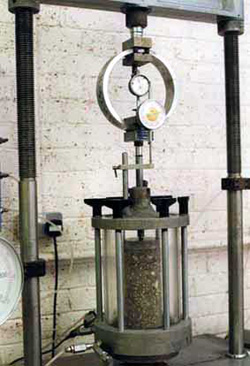Daily Schedule:
12:00pm MST - Session begins
3:00pm MST - Adjournment
This course is divided into four sessions. Each session will be 3 hours in duration. The sessions will be held on Feb 09-10 & 16-17, 2023, respectively.
If you are unable to attend any of the sessions a recording will be made available.
Description
 The Soils Engineering for Practical Applications Workshop is a basic geotechnical course which will provide practical knowledge for both generalists and those needs to upgrade their knowledge in geotechnical design field. Each theoretical concept presented will be linked to practical applications in the geotechnical engineering area.
The Soils Engineering for Practical Applications Workshop is a basic geotechnical course which will provide practical knowledge for both generalists and those needs to upgrade their knowledge in geotechnical design field. Each theoretical concept presented will be linked to practical applications in the geotechnical engineering area.
The purpose of this workshop is to familiarize participants with the application of basic soil mechanics principles to the design and analysis of simple geotechnical structures including: earth works , bearing capacity of shallow foundations, soil retaining structures and slope stability. In addition the theory of consolidation and practice of site or ground investigation will be discussed.
The course objective is to impart to the participants the necessary knowledge and skills to determine the minimum level of geotechnical effort needed on an engineering project and /or how to deal with geotechnical information/personnel on a given project.
The participants will develop knowledge and appreciation of geotechnical activities in all project phases and understanding of different soils and how they behave.
No prior knowledge of the subject is required; the course content follows a simple starting level into advanced level that will be built step by step in class. The concepts presented in each lesson are concise and specifically directed at a particular practical operation in the geotechnical design process.
Recommendations are presented on how to efficiently layout borings, how to minimize approach embankment settlement, and how to transmit design information properly to construction. Basic examples are included in several lessons for hands-on knowledge.
Objectives
Course objective is to impart to the participants the necessary knowledge and skills to determine the minimum level of geotechnical effort needed on an engineering project. A high level of interaction between the expert instructor and the students will be used to facilitate the development of knowledge and skills in basic geotechnical concepts and analyses. Upon completion of the course, the participants will have demonstrated learning of the following:
- Knowledge of the minimum level of geotechnical input in various project phases of an engineering project,
- Knowledge of the equipment and procedures used to implement a subsurface investigation of soil and rock conditions,
- Knowledge of the basic soil test procedures and application of soil test results,
- Knowledge and basic skills in procedures used for determining bearing capacity and settlement of spread footing foundations,
- The interpretation of field and laboratory test data and derivation of meaningful parameters for geotechnical design * Knowledge of the format and minimum content of an adequate foundation report.
- Methodologies of soil classification and property testing, basics of clay mineralogy
- Concepts of pore water pressure, effective stress and capillarity and their implications on soil behaviour including swelling, shrinkage and frost action.
- One-dimensional settlement and consolidation
- Concept and measurement of soil shear strength
- Design implications of consolidation, flow, settlement and shear strength and how the basic concepts can be applied in engineering practice.
- Introductory analysis of lateral earth pressures
Target Audience
 This course is geared to practicing engineers, technicians and technologists who routinely deal with soils and foundations problems. No theoretical background is required in soil mechanics or foundation engineering although computational skills are necessary for the design sessions.
This course is geared to practicing engineers, technicians and technologists who routinely deal with soils and foundations problems. No theoretical background is required in soil mechanics or foundation engineering although computational skills are necessary for the design sessions.
The categories of personnel at all engineering levels who could benefit from this workshop include drillers, Non-soils engineers , Industry tech/sales, representatives , Public works professionals , Engineers-in-training, Project engineers and managers, Architects and landscape architects , Geologists and earth scientists , Civil and other engineers, geotechnical, bridge design, highway design, structural engineers, construction engineers, contractors, owners, or any professional involved in the design, construction, inspection, testing, maintenance and specification of foundations. The greatest impact will be achieved by convincing structural, design, and construction engineers to use procedures from this course as a guide for routine geotechnical work. One of the major benefits of this course is to give engineers an appreciation of activities outside their specialties that influence, or are influenced by, the work of the geotechnical engineer.
Workshop Benefits
- Obtain a working knowledge of soil behavior and many of the basic concepts of soil engineering
- Learn to know when and where you need soil tests and what types, how to correctly interpret soils reports, what field conditions are unsafe for personnel, and other important considerations
- Understand soil compaction and use of geosynthetics in earthworks
- Be prepared to continue on your own with further study of soil and ground engineering
- Become more effective in your job...whether working on projects with soil construction or working in a support capacity in geotechnical engineering practice
At the end of this workshop a participant will be able to:
- Define what constitutes an engineering soil
- Explain why different clay minerals exhibit different degrees of activity for example swelling characteristics
- Describe the fundamental properties of soil particles that are of importance in engineering (mineralogy, shape, size and texture) and their basic influence on soil behavior.
- Classify soils according to the Unified classification systems.
- Relate the meaning and importance of the plasticity or Atterberg limits in soils and have a general feel for typical values of these indexes in soils.
- Calculate and use all the phase relationship formulae in dry and fully saturated soils.
- Define the term pore pressure and calculate the pore pressure distribution with depth under hydrostatic conditions.
- Calculate the coefficient of permeability for soils.
- Calculate hydraulic gradients using Bernoulli's equation for simple seepage flow problems.
- State Darcy's law and calculate seepage rates and quantities for one dimensional flow.
- Calculate flow rates and quantities in homogenous and isotropic or an-isotropic soils by making use of flow nets.
- Calculate the pore pressure distribution and stability against uplift of hydraulic structures as well as the potential for seepage erosion at the downstream exit.
- Recognize how stresses are distributed in a soil mass due to external and internal loads and be able to calculate these stresses.
- Recognize how settlement occurs in soil and be able to calculate settlements based on varying loading and soil conditions.
- Explain how strength is classified and quantified in soils and how those strength values are used in design.
To register for this course click on the register button above, or by fax. To register
by fax, download and fill our registration form,
then fax it to (888) 849-4871. Mail your cheque to our address
. If you have a question regarding this course, please click
here.
P.S. GIC can offer many of our courses at a location of your choice, at your convenience
and tailored to your special needs. For more information, please contact us.